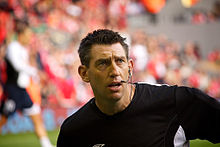
Justin Raymond Hoyte is a former professional footballer. Primarily a right back, Hoyte previously played for English clubs Arsenal, Sunderland, Middlesbrough, Millwall and Dagenham & Redbridge, as well as American side FC Cincinnati in both the USL and MLS. As an international, he represented England up to under-21 level and Trinidad and Tobago at senior level.
Robert Styles is an English football Referee from Waterlooville, Hampshire. Throughout his career he officiated in the multiple lower level leagues before making the national list in 1996. He refereed his first FA Premier League game in 2000, and became FIFA listed in 2002. Styles retired from refereeing in 2009.
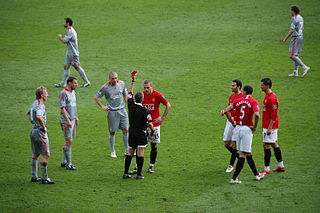
Alan G. Wiley is a former English football referee in the FA Premier League, who is based in Burntwood, Staffordshire.
Philip Dowd is a retired English professional football referee who officiated primarily in the Premier League. He is based in Stoke-on-Trent, Staffordshire, and was a member of the Staffordshire Football Association.
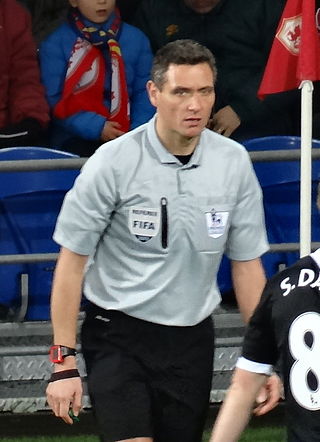
Andre Marriner is a retired English professional football referee based in Solihull, West Midlands. He is a member of the Birmingham County Football Association.

Peter Jones ) is a former English football referee, who retired from officiating at the end of the 2001–02 season. He lives in Quorn, near Loughborough, Leicestershire, and works as a referee assessor.
Neale S. Barry is a retired English football referee, and current FA Head of Senior Referee Development. He originates from Scunthorpe, Lincolnshire, and now lives near Grantham, Lincolnshire.
Keren P. J. Barratt is an English former football referee, who operated in the Football League and Premier League. He was based in Coventry, West Midlands, during his time on the List.
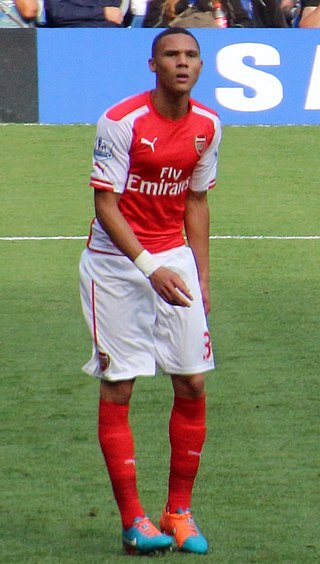
Kieran James Ricardo Gibbs is an English former professional footballer who played as a left-back.
Anthony Taylor is an English professional football referee from Wythenshawe, Manchester. In 2010, he was promoted to the list of Select Group Referees who officiate primarily in the Premier League, and in 2013 became a listed referee for FIFA allowing him to referee European and international matches. In 2015, he officiated the Football League Cup final at Wembley Stadium when Chelsea defeated Tottenham Hotspur 2–0. Taylor returned to Wembley later that year to officiate the Community Shield as Arsenal beat Chelsea 1–0. He refereed the 2017 and 2020 FA Cup finals, both between Chelsea and Arsenal; Arsenal won on both occasions 2–1. Upon the selection, he became the first man to referee a second FA Cup final since Arthur Kingscott in 1901.
The 2000–01 FA Cup was the 120th season of the world's oldest knockout football competition, the FA Cup. The competition was won by Liverpool, who came from 1–0 behind against Arsenal to eventually win 2–1 in the final. The final was played outside England for the first time, at the Millennium Stadium in Cardiff, because Wembley Stadium was being knocked down to be replaced with a new stadium.
The 1997–98 FA Cup was the 117th staging of the FA Cup. The competition was won by Arsenal with a 2–0 victory against Newcastle United at Wembley Stadium.
Philip J. Joslin is an English association football referee who operates in the Football League. In addition, he has previously held the position of assistant referee for both the Premier League and FIFA, and also fulfilled that role in the 1998 FA Cup Final at Wembley.
Anthony Bates is a former English association football referee who operates in the Football League, and previously served as assistant referee for UEFA in the Euro 96 competition. He also refereed the FA Women's Cup Final in 2007. On average, Bates gave a high 4.0 cards per game in the 1998–99 season, the highest so far in his career.

Daniel Nii Tackie Mensah Welbeck is an English professional footballer who plays as a forward for Premier League club Brighton & Hove Albion.

Gavin Andrew Hoyte is a professional footballer who plays as a defender for Maidstone United. He has been a member of the Trinidad and Tobago national team.
The 2011–12 FA Cup was the 131st season of the world's oldest football knock-out competition, the FA Cup. The closing date for applications was 1 April 2011, and saw 825 clubs apply to enter. On 8 July 2011, the FA announced that 763 clubs had been accepted, which remains, as of 2022-23, the record number of entrants. The final was played on 5 May 2012 at Wembley Stadium. Chelsea won their fourth title in 6 years, and seventh overall, with a 2–1 victory over Liverpool.
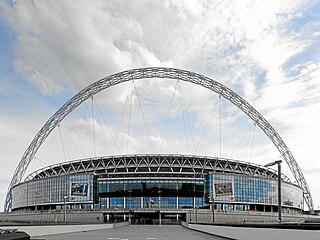
The 2014 FA Cup final was an association football match between Premier League clubs Arsenal and Hull City at Wembley Stadium in London, England, on 17 May 2014. It was the 133rd FA Cup final overall and the showpiece match of English football's primary cup competition, the Football Association Challenge Cup, organised by the Football Association (FA). Hull made their first appearance in an FA Cup Final, while Arsenal equalled Manchester United's record of 18 final appearances.
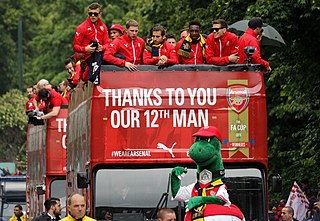
The 2014–15 FA Cup, also called the 2014–15 FA Challenge Cup, was the 134th occurrence of the FA Cup, the main domestic cup in English football and the oldest knockout competition in the world. It was the first season when the BBC and BT Sport hosted televised matches, seven years after the BBC lost the rights to ITV. The 2014–15 season's Cup also marked the first time that 3G artificial pitches were allowed in all rounds of the competition, designed to lower costs for maintenance. After Queens Park Rangers, Luton Town, Oldham Athletic and Preston North End trialled artificial pitches in the 1980s, they were made illegal in 1995.
The 2015–16 FA Cup was the 135th edition of the oldest recognised football tournament in the world. It was sponsored by Emirates, and known as The Emirates FA Cup for sponsorship purposes. It began with the extra preliminary round on 15 August 2015, and concluded with the final on 21 May 2016. The FA Cup winner qualifies for the 2016–17 UEFA Europa League group stage.
